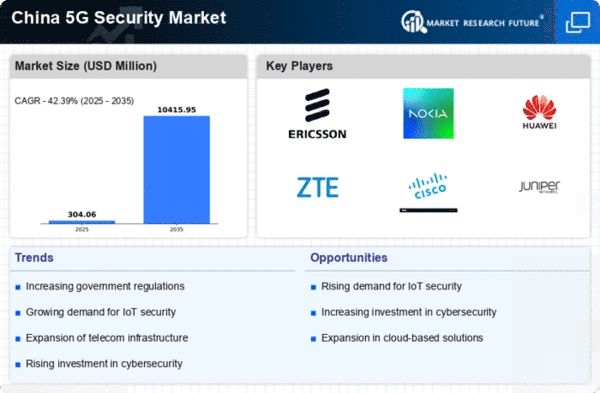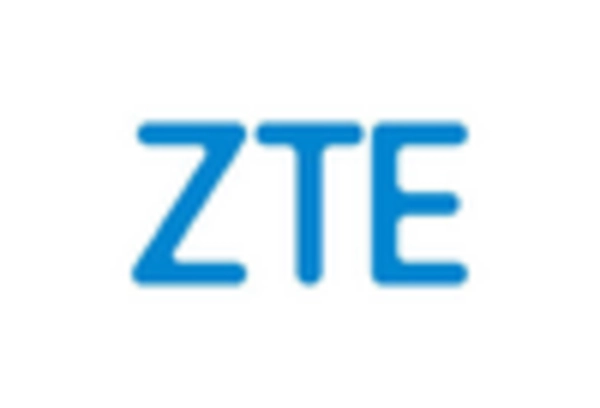Rising Cyber Threats
The increasing frequency and sophistication of cyber threats in China is a primary driver for the 5g security market. As organizations transition to 5G networks, they face heightened risks from cybercriminals exploiting vulnerabilities. Reports indicate that cyberattacks in China have surged by over 30% in recent years, prompting businesses to prioritize security measures. This trend is likely to accelerate the demand for advanced security solutions tailored for 5G environments. The 5g security market is responding by developing innovative technologies, such as AI-driven threat detection and response systems, to mitigate these risks. Consequently, organizations are investing significantly in security infrastructure to safeguard their data and operations, which is expected to contribute to the overall growth of the 5g security market.
Demand for Enhanced Data Privacy
As data privacy concerns continue to rise among consumers and businesses in China, the demand for robust security solutions in the 5g security market is becoming more pronounced. With the implementation of stricter data protection regulations, organizations are compelled to adopt advanced security measures to comply with legal requirements. The 5g security market is witnessing a shift towards solutions that prioritize data encryption, secure access controls, and user privacy. Companies are increasingly investing in technologies that not only protect their data but also enhance consumer trust. This growing emphasis on data privacy is likely to drive the development of innovative security solutions tailored for 5G networks, thereby contributing to the expansion of the market.
Increased Adoption of IoT Devices
The proliferation of Internet of Things (IoT) devices in China is significantly influencing the 5g security market. With millions of devices connecting to 5G networks, the potential for security breaches escalates. It is estimated that by 2025, there will be over 1 billion IoT devices in use across the country, creating a vast attack surface for cyber threats. This surge in IoT adoption necessitates the implementation of comprehensive security measures to protect sensitive data and ensure device integrity. The 5g security market is responding by offering specialized security solutions designed to address the unique challenges posed by IoT devices. As organizations increasingly recognize the importance of securing their IoT ecosystems, investments in 5G security solutions are expected to rise, driving market growth.
Government Initiatives and Policies
The Chinese government has implemented various initiatives aimed at enhancing cybersecurity, which serves as a crucial driver for the 5g security market. Policies promoting the adoption of secure 5G technologies are being established to protect national interests and critical infrastructure. For instance, the government has allocated approximately $2 billion to bolster cybersecurity measures across various sectors. These initiatives not only encourage businesses to adopt robust security frameworks but also foster collaboration between public and private sectors. The 5g security market is likely to benefit from these policies, as they create a conducive environment for the development and deployment of advanced security solutions. As a result, companies are expected to align their strategies with government regulations, further propelling the growth of the market.
Technological Advancements in Security Solutions
Rapid technological advancements in security solutions are propelling the growth of the 5g security market. Innovations such as machine learning, artificial intelligence, and blockchain technology are being integrated into security frameworks to enhance threat detection and response capabilities. These advancements enable organizations to proactively identify and mitigate potential security risks associated with 5G networks. The 5g security market is witnessing a surge in demand for cutting-edge security solutions that leverage these technologies. As businesses seek to stay ahead of evolving cyber threats, investments in advanced security technologies are expected to increase. This trend indicates a promising future for the 5g security market, as organizations prioritize the implementation of state-of-the-art security measures.
















